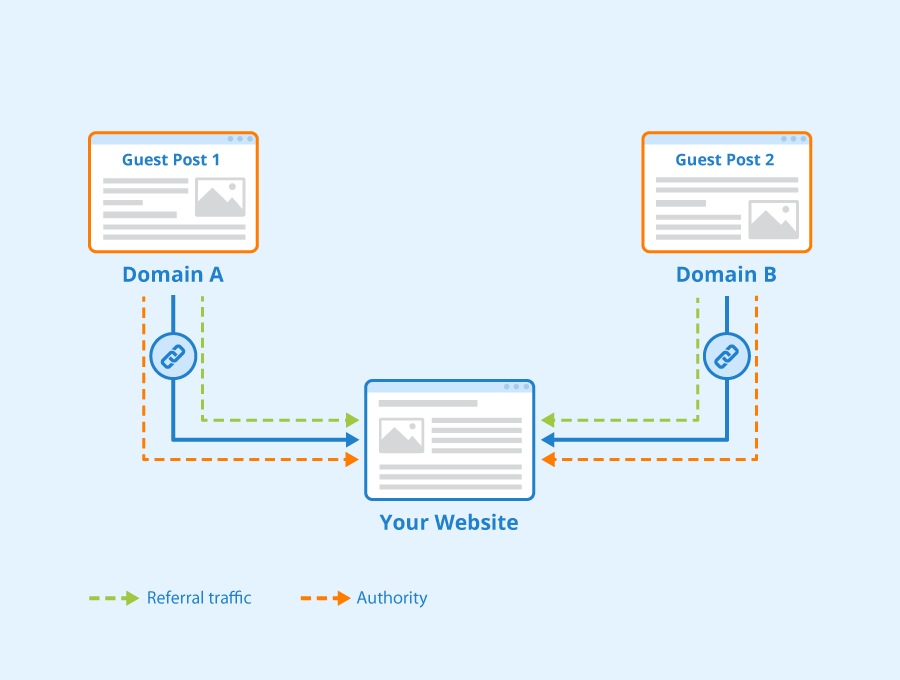


Off-page SEO refers to the activities and factors that affect your website's search engine rankings, but are not directly under your control. Off-page SEO is important because it helps search engines understand the quality and relevance of your website, and it can have a big impact on your website's visibility and success. Here are some ways to improve your off-page SEO:
The Importance of Off-Page SEO
Off-page SEO is an essential part of SEO and there are several strategies that you can use to promote your business. Social media is a good way to promote your brand and generate backlinks. However, you should be aware of the ways of spotting fake reviews and flagging Google as a "gamer"!
Guest blogging
Guest blogging is an excellent way to generate traffic and improve organic search rankings. The key is to target sites that relate to your niche and are of high quality. If you are a marketing agency, consider targeting sites that focus on marketing and business best practices. Guest blogging also enables you to increase the visibility of particular pages on your website.
Before beginning your SEO off-page guest blogging efforts, conduct keyword research to ensure that your content is relevant and serves your ultimate goal. This will help you identify sites with high-quality backlink profiles and ensure that your articles are published on relevant websites. Guest blogging on authoritative sites will help your website gain domain authority and boost your site's visibility in Google's SERPs.
Another advantage of guest blogging is that you can increase your SERP rankings and generate leads. Just make sure that you write useful, informative articles that your target audience will find useful. It is also crucial to focus on user experience when creating your content. Try to educate and entertain your readers with your posts, and you will be rewarded with positive results.
The main benefit of guest blogging is SEO. High-quality links from authoritative sites can boost the ranking power of your website on Google. Guest posting also benefits the host blog. It allows site owners to meet their content marketing needs, which is a key factor for SEO. Your guest posts should contain links to related resources.
When creating a guest post, make sure that you write for a high-quality website that has a lot of targeted traffic. You also want to provide value to your readers. This way, they'll be more likely to click on your link and visit your site.

Link insertion
Link insertion is one of the most crucial aspects of off-page SEO. To be effective, marketers must understand the different types of backlinks and the factors that determine their value. The first type of link is natural. It comes from someone who follows your site or finds your content while doing research. It should be unique and high quality.
Another type of link is do-follow. This type of link passes PageRank authority to your site. The best way to start this type of link building is to build strategic relationships. Make sure to avoid spamming as this will quickly get you banned. Instead, try to be helpful and share your knowledge with other members. This will make your links more valuable to other members. A good way to get started is with a website like Quora.
Adding links to your site is a vital part of your off-page SEO strategy. Not only does it increase the number of backlinks to your website, but it also helps improve the visibility of your page in search results. This is because search engines use this data to determine the value of web pages. The more backlinks your website receives, the higher it will rank.
Link insertion for off-page SEO is essential for any website. By getting your site linked to other websites and social media sites, you can increase the number of visitors. Getting backlinks from high authority sites is an excellent way to increase your search engine rankings. But you have to remember that it is only effective if you get them from reputable sources.
Podcasting
Podcasts can be a powerful tool for off-page SEO. Google indexes podcasts and ranks them based on the content they contain. Additionally, Google uses technology to transcribe audio and videos. This makes it easier for Google to understand what is said in a podcast. In addition, podcasts can boost organic traffic for websites.
When it comes to podcasting for off-page SEO, a regular schedule is critical. Not only does this signal to audiences that you are a reliable content creator, but it also helps your website's reputation in search engines. Podcasts are also a great way to create authority links, which will help your site rank well in the search engines.
The key to success with podcasting is to create a high-quality, unique podcast. If your content is not good enough, there is little chance of it being listened to. In addition to audio, you should also create transcripts for your episodes. This way, visitors can link back to the content of an episode or even visit your podcast page. As with all SEO strategies, keyword research is key to a successful podcast. Choosing the right keywords and phrases will determine your visibility and target audience.
When you create a podcast, you should include relevant keywords in the title and description of the podcast. If you want to reach a wider audience, you can also incorporate the name of a fellow podcaster in the title. This will help you attract fans of other podcasts. Podcast descriptions should also contain call-to-actions. Moreover, you should try to use structured data on your podcast pages, since it will make your podcast pages look different on Google.
You can also make use of social media to increase your audience. Podcast listeners are interested in the content, so you should ensure that your content is good. If you use keywords too often, you will alienate your audience and lose your voice.
Syndication
Syndication is an important component of off-page SEO. It allows your content to be shared on various websites that are related to your niche. Many sites allow content syndication and you can find these sites through a Google search. To find these sites, use search operators such as "topic" or "keyword". If you're unsure where to find relevant content, you can also use site explorers to find relevant websites.
While content syndication can be a simple way to increase the visibility of your content, it's important to follow all of the best SEO practices. Be sure to include canonical tags and references, and sign a proper agreement with syndication partners. Otherwise, you risk getting penalized by Google for duplicate content.

Syndication can be done manually or with the help of automated tools. However, it's not a simple process. Don't rely on automated tools or mass emailing services if you don't have the time to do it yourself. If you're not experienced at doing it properly, you'll have poor results and end up with spammy-looking content. It's also important to ensure that your content contains the proper meta-tags. This can improve the quality of your content and increase your brand's reputation.
The process of syndication involves republishing your content on other websites. In doing so, you'll earn valuable backlinks and SEO rankings and gain a wider audience. This can also give your website a wider audience and increased business. So, if you're a content creator, this technique should be a part of your overall content marketing strategy.
Syndication for off-page SEO involves creating content and getting it published on high-quality sites. When it's done correctly, it's a win-win situation for both parties. Syndication can help you reach your target audience and establish thought leadership in your niche.
Building a brand
Off-page SEO is a great way to boost your brand's visibility. It can help you target your audience and build a brand. The key is to cover as many search engines as possible. More search engines mean more opportunities for your business to be found. This is an important component of your online presence, but many people don't realize the importance of this tactic.
Social media is an excellent tool for putting your brand in front of customers and potential clients. Most customers will contact brands on social media before they can contact them directly. To increase your exposure and maintain a positive social presence, stay active and respond to posts professionally. Another great tool for building brand awareness is forums.